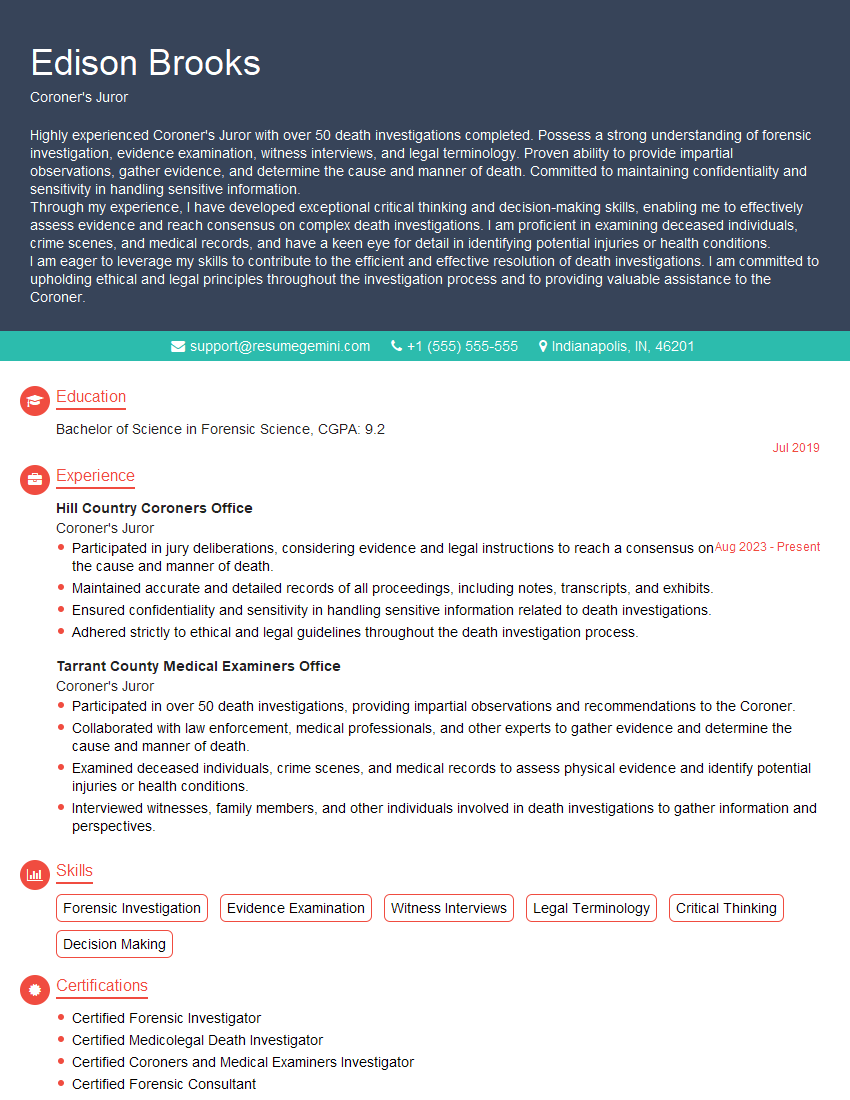Are you a seasoned Coroner’s Juror seeking a new career path? Discover our professionally built Coroner’s Juror Resume Template. This time-saving tool provides a solid foundation for your job search. Simply click “Edit Resume” to customize it with your unique experiences and achievements. Customize fonts and colors to match your personal style and increase your chances of landing your dream job. Explore more Resume Templates for additional options.

Edison Brooks
Coroner’s Juror
Summary
Highly experienced Coroner’s Juror with over 50 death investigations completed. Possess a strong understanding of forensic investigation, evidence examination, witness interviews, and legal terminology. Proven ability to provide impartial observations, gather evidence, and determine the cause and manner of death. Committed to maintaining confidentiality and sensitivity in handling sensitive information.
Through my experience, I have developed exceptional critical thinking and decision-making skills, enabling me to effectively assess evidence and reach consensus on complex death investigations. I am proficient in examining deceased individuals, crime scenes, and medical records, and have a keen eye for detail in identifying potential injuries or health conditions.
I am eager to leverage my skills to contribute to the efficient and effective resolution of death investigations. I am committed to upholding ethical and legal principles throughout the investigation process and to providing valuable assistance to the Coroner.
Education
Bachelor of Science in Forensic Science
July 2019
Skills
- Forensic Investigation
- Evidence Examination
- Witness Interviews
- Legal Terminology
- Critical Thinking
- Decision Making
Work Experience
Coroner’s Juror
- Participated in jury deliberations, considering evidence and legal instructions to reach a consensus on the cause and manner of death.
- Maintained accurate and detailed records of all proceedings, including notes, transcripts, and exhibits.
- Ensured confidentiality and sensitivity in handling sensitive information related to death investigations.
- Adhered strictly to ethical and legal guidelines throughout the death investigation process.
Coroner’s Juror
- Participated in over 50 death investigations, providing impartial observations and recommendations to the Coroner.
- Collaborated with law enforcement, medical professionals, and other experts to gather evidence and determine the cause and manner of death.
- Examined deceased individuals, crime scenes, and medical records to assess physical evidence and identify potential injuries or health conditions.
- Interviewed witnesses, family members, and other individuals involved in death investigations to gather information and perspectives.
Certificates
- Certified Forensic Investigator
- Certified Medicolegal Death Investigator
- Certified Coroners and Medical Examiners Investigator
- Certified Forensic Consultant
Languages
- English
- French
- German
Career Expert Tips:
- Select the ideal resume template to showcase your professional experience effectively.
- Master the art of resume writing to highlight your unique qualifications and achievements.
- Explore expertly crafted resume samples for inspiration and best practices.
- Build your best resume for free this new year with ResumeGemini. Enjoy exclusive discounts on ATS optimized resume templates.
How To Write Resume For Coroner’s Juror
- Highlight your experience and expertise in forensic investigation and death investigation.
- Quantify your accomplishments whenever possible, using specific numbers and metrics.
- Showcase your critical thinking and decision-making skills, emphasizing your ability to analyze evidence and reach sound conclusions.
- Emphasize your commitment to confidentiality and ethical conduct in handling sensitive death investigation information.
- Tailor your resume to each specific Coroner’s Juror position you apply for, highlighting the skills and experience that are most relevant to the job requirements.
Essential Experience Highlights for a Strong Coroner’s Juror Resume
- Participate in death investigations, providing impartial observations and recommendations to the Coroner.
- Collaborate with law enforcement, medical professionals, and other experts to gather evidence and determine the cause and manner of death.
- Examine deceased individuals, crime scenes, and medical records to assess physical evidence and identify potential injuries or health conditions.
- Interview witnesses, family members, and other individuals involved in death investigations to gather information and perspectives.
- Participate in jury deliberations, considering evidence and legal instructions to reach a consensus on the cause and manner of death.
- Maintain accurate and detailed records of all proceedings, including notes, transcripts, and exhibits.
- Ensure confidentiality and sensitivity in handling sensitive information related to death investigations.
- Adhere strictly to ethical and legal guidelines throughout the death investigation process.
Frequently Asked Questions (FAQ’s) For Coroner’s Juror
What is the role of a Coroner’s Juror?
A Coroner’s Juror is a member of a jury that assists the Coroner in determining the cause and manner of death in cases where the cause of death is unknown or suspicious. The jury reviews evidence, hears testimony from witnesses, and makes recommendations to the Coroner.
What are the qualifications to become a Coroner’s Juror?
Coroner’s Jurors are typically required to be at least 18 years old, have a high school diploma or equivalent, and be able to understand and communicate in English. Additional qualifications may vary depending on the jurisdiction.
How are Coroner’s Jurors selected?
Coroner’s Jurors are selected from a pool of eligible citizens in the jurisdiction. The selection process may involve random selection, a lottery system, or a nomination process.
What is the term of service for a Coroner’s Juror?
The term of service for a Coroner’s Juror varies depending on the jurisdiction. It can range from a few days to several years.
What are the responsibilities of a Coroner’s Juror?
Coroner’s Jurors have a variety of responsibilities, including reviewing evidence, hearing testimony from witnesses, and making recommendations to the Coroner regarding the cause and manner of death.
What are the benefits of serving as a Coroner’s Juror?
Serving as a Coroner’s Juror can provide a number of benefits, including the opportunity to learn about the legal process, contribute to the community, and gain valuable experience in forensic investigation.
What are the challenges of serving as a Coroner’s Juror?
Serving as a Coroner’s Juror can be challenging at times. The work can be emotionally demanding, and jurors may be exposed to graphic or disturbing information.